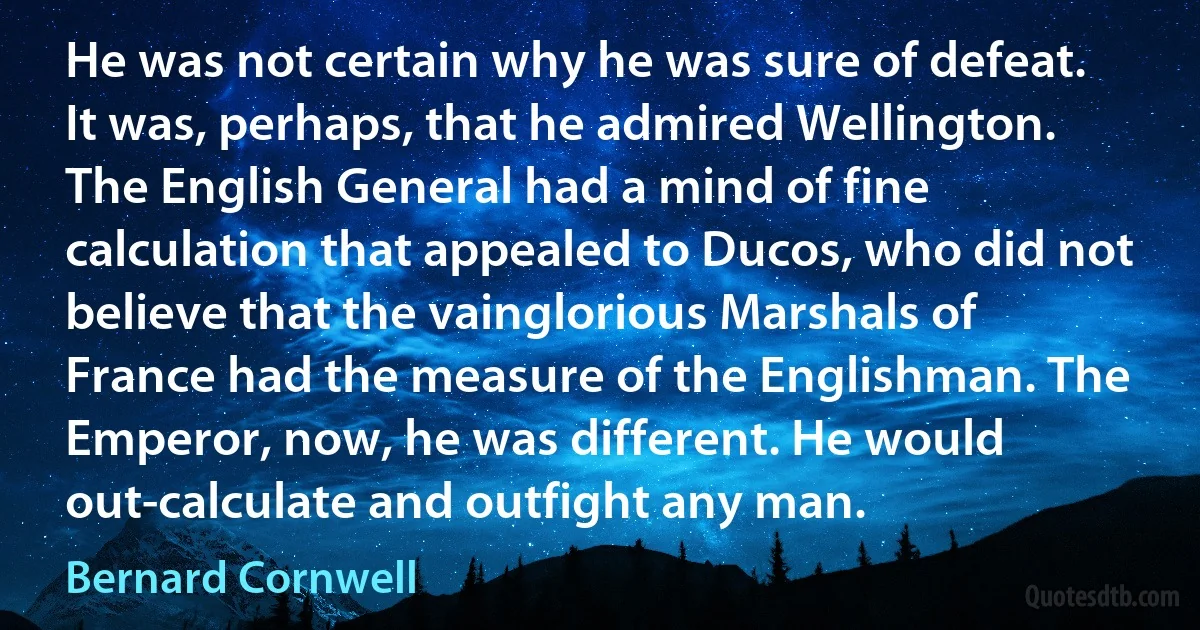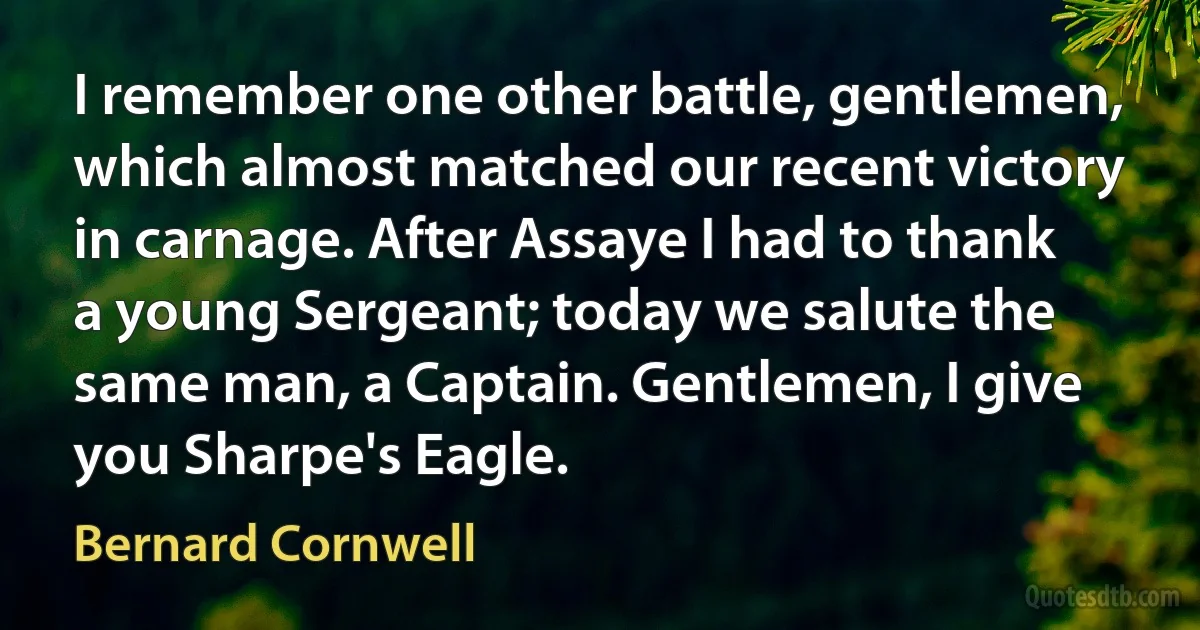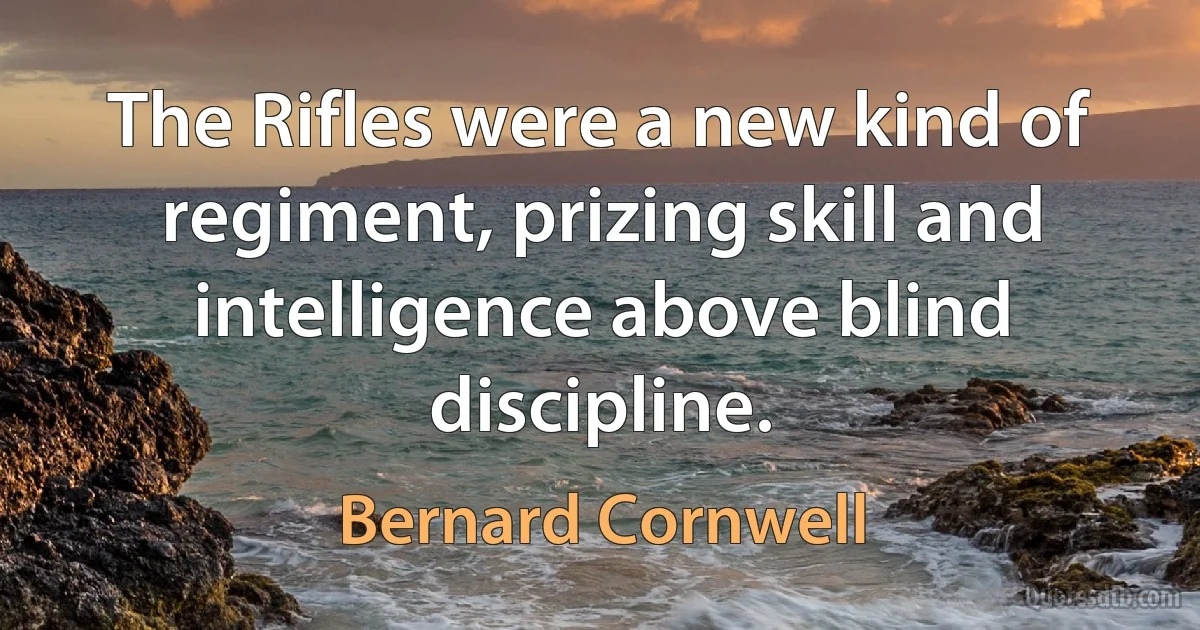Bernard Cornwell quotes - page 5
Bernard Cornwell is a British author best known for his historical novels, particularly "The Last Kingdom" and "Sharpe" series. His works immerse readers in vividly detailed periods of British history and warfare. He is celebrated for his meticulous research and dynamic storytelling. Here are 195 of his quotes:
Sensible thing to do, is for us to bugger off out of here and got to bed." "Sensible thing to do, is get out the bloody army and die in bed." "But that's not why we joined, is it?" "Speak for yourself, sir. I just joined to get a square meal. Getting killed wasn't really part of the idea at all.

Bernard Cornwell
Sharpe had no thought of deserting now, for now he was about to fight. If there was any one good reason to join the army, it was to fight. Not to hurry up and do nothing, but to fight the King's enemies, and this enemy had been shocked by the awful violence of the close-range volley and now they stared in horror as the redcoats screamed and ran toward them.

Bernard Cornwell
He had thought the army would pay for the voyage, but the army had refused, saying that Sharpe was accepting an invitation to join the 95th Rifles and if the 95th Rifles refused to pay his passage then damn them, damn their badly colored coats, and damn Sharpe. [...] Britain had sent Sharpe to India, and Britain, Sharpe reckoned, should fetch him back.

Bernard Cornwell
It was the French way, the method that had brought victory to the armies of the Empire, the irresistible mass. Throw the mass like a human missile at the Castle's defenders, overwhelm them with targets, terrify them with the massed drummers in the column's centre, and push over the dead to victory.

Bernard Cornwell
Whenever human beings don't know what to do, they call in the soldiers. Force ends everything, yes? That's what they did with Christ, Mr. Sharpe, they called in the soldiers. They didn't know what to do with him so they called on men like you and I don't suppose they thought twice about what they were doing, they just banged in the nails. You'd have done that, wouldn't you?

Bernard Cornwell
Poor bloody Dale, Sharpe thought, to be betrayed in his first battle. If he survived he would be invalided out of the army. His broken body, good for nothing, would be sent to Lisbon and there he would have to rot on the quays until the bureaucrats made sure he had accounted for all his equipment. Anything missing would be charged to the balance of his miserable wages and only when the account was balanced would he be put onto a foul transport and shipped to an English quayside. There he was left, the army's obligation discharged, though if he was lucky he might be given a travel document that promised to reimburse any parish overseer who fed him while he traveled to his home. Usually the overseers ignored the paper and kicked the invalid out of their jurisdiction with an order to go and beg somewhere else. Dale might be better off dead than face all that.

Bernard Cornwell
He could chafe against the rich and privileged but he acknowledged that the army had taken him from the gutter and put an officer's sash round his waiste and Sharpe could think of no other job that would offer a low-born bastard on the run from the law the chance of rank and responsibility.

Bernard Cornwell
Sharpe could feel the excitement of the Company, their confidence, and he marvelled at it. They were enjoying it, taking on sixteen times their number, and he did not understand that it was because of him. Harper knew, Knowles knew, that the tall Rifle Captain who was not given to rousing speeches could nevertheless make men feel that the impossible was just a little troublesome and that victory was a commonplace where he led.

Bernard Cornwell
This evening, he planned to make Sharpe drunk. He planned to force the grief out into the open and he would do it as the Irish knew how to do it, with a wake. [...] A wake, a decent, drunken, laughing wake. Hogan had ordered Harry Price to attend and he would force Sharpe to drink, to talk, to remember Teresa, and in the morning the grief would already be turning into healthy regret.

Bernard Cornwell
Sharpe had seen columns before, and was puzzled by them. [...] These columns had around forty men in a rank and twenty in each file. The French used such a formation, a great battering block of men, because it was simpler to persuade conscripts to advance in such an array and because, against badly trained troops, the very sight of such a great mass of men was daunting. But against redcoats? It was suicide.

Bernard Cornwell
Bernard Cornwell
 Occupation: British Novelist
Occupation: British Novelist
Born: February 23, 1944
Quotes count: 195
Wikipedia: Bernard Cornwell











